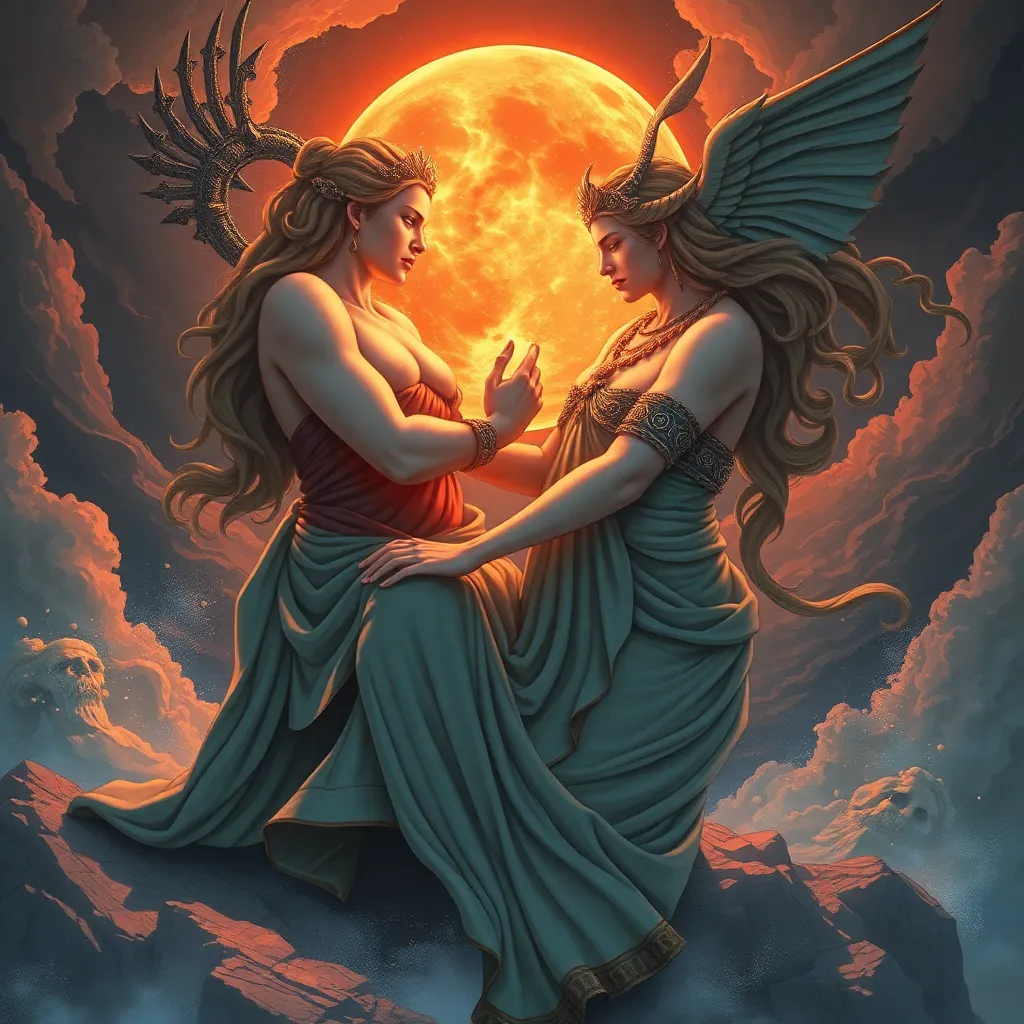Hera’s Relationships: Love, Betrayal, and Power Dynamics
I. Introduction
Hera, the queen of the gods in Greek mythology, is a figure of immense power and complexity. Known primarily as the goddess of marriage and family, she embodies the dual nature of love and vengeance. Her relationships, particularly with her husband Zeus, her siblings, and other deities, are central to understanding her character. This article aims to explore the intricate web of love, betrayal, and power dynamics that define Hera’s relationships, unveiling the layers of her personality and the consequences of her actions.
II. Hera and Zeus: The Complexity of Divine Marriage
The union of Hera and Zeus is one of the most significant narratives in Greek mythology. Initially, their love story was steeped in romance and divine attraction. Zeus, captivated by Hera’s beauty, pursued her relentlessly until she agreed to marry him.
However, their marriage was fraught with power struggles. As the king of the gods, Zeus often exerted his authority, which led to tension between the two. Hera, known for her strong will, frequently challenged Zeus, leading to conflicts that highlighted the complexities of their relationship.
One of the most damaging elements of their union was Zeus’s numerous infidelities. His many affairs with mortal women and other goddesses fueled Hera’s jealousy and resentment. In response, Hera often took drastic actions against his lovers and their children, showcasing her fierce protective nature but also her capacity for vengeance.
III. The Role of Jealousy in Hera’s Relationships
Jealousy is a central theme in Hera’s life, driving many of her actions and decisions. This emotion manifests most clearly in her reactions to Zeus’s betrayals. Rather than accepting her husband’s infidelities, Hera often took revenge on those involved, sometimes with devastating consequences.
- Notable myths of revenge:
- Her punishment of Io, a mortal woman loved by Zeus, who was transformed into a cow to escape Hera’s wrath.
- The torment of Heracles, one of Zeus’s illegitimate children, whom she tried to kill as a baby.
The psychological implications of Hera’s jealousy are significant. Her need to assert power and control in her relationships often led to tragic outcomes, highlighting the destructive nature of jealousy in both divine and mortal realms.
IV. Sisterly Bonds: Hera and Her Siblings
Hera’s relationships with her siblings, particularly Hestia and Demeter, reveal another dimension of her character. As sisters, they shared a bond that was both supportive and competitive, influenced by their roles within the pantheon.
- Relationships with siblings:
- Hestia, the goddess of the hearth, represented stability and domesticity, contrasting with Hera’s more tumultuous nature.
- Demeter, the goddess of the harvest, shared a nurturing aspect that sometimes clashed with Hera’s vengeful tendencies.
The dynamics within this sisterly circle profoundly shaped Hera’s identity. Her relationships with her sisters often provided her with both strength and rivalry, influencing her decisions in various myths.
V. Hera’s Relationships with Other Goddesses
Within the pantheon of Greek mythology, Hera navigated a complex landscape of alliances and rivalries among other goddesses. Her relationships with figures such as Athena and Artemis illustrate the power dynamics at play among the Olympians.
- Allies and rivals:
- Athena, known for her wisdom, sometimes stood as an ally to Hera, but their differing approaches to power often created tension.
- Artemis, the goddess of the hunt, embodied independence, which could be seen as a challenge to Hera’s authority as the goddess of marriage.
The power dynamics in these female relationships reflect the broader themes of competition and cooperation among women in mythology, showcasing how Hera’s relationships with other goddesses were influenced by her own struggles for power and recognition.
VI. Hera’s Relationships with Mortals
Hera’s interactions with mortals reveal another facet of her complex character. As a goddess, she often intervened in the lives of heroes, sometimes aiding them but more often punishing them for their connections to Zeus.
- Consequences of her relationships with mortals:
- Heracles, while a demigod, faced relentless challenges due to Hera’s wrath, illustrating how her jealousy extended beyond the divine realm.
- The Trojan War was partially ignited by Hera’s desire for vengeance against Paris, who slighted her in favor of Aphrodite.
This duality of Hera’s role as both protector and punisher highlights her complexity. While she could be nurturing, her fierce loyalty to her marriage and her jealousy often led to catastrophic consequences for those who crossed her.
VII. Themes of Betrayal and Revenge
Betrayal is a recurring theme in Hera’s life, shaping her identity and actions. Key myths illustrate the profound impact of betrayal on her psyche and subsequent decisions.
- Key myths illustrating betrayal:
- The story of Zeus’s numerous affairs often serves as the backdrop for Hera’s vengeful actions.
- Her treatment of mortals like Io and Heracles demonstrates the far-reaching consequences of her need for revenge.
The consequences of her vengeful actions often lead to tragic outcomes, not only for her rivals but also for herself. The moral implications of betrayal in Hera’s story prompt reflections on the nature of love, loyalty, and revenge.
VIII. Conclusion
In summary, Hera’s relationships define her as one of the most complex figures in Greek mythology. Through her love and betrayal, she navigates the intricate dynamics of power, jealousy, and revenge. The significance of her relationships extends beyond mere mythology, reflecting profound truths about human emotion and societal roles.
As we reflect on Hera’s legacy, we see that her story remains relevant in modern interpretations of mythology. The struggles of love, the pain of betrayal, and the quest for power resonate with contemporary audiences, ensuring that Hera’s character continues to captivate and intrigue.




